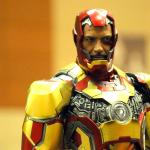Sunday’s New York Times featured a fascinating profile of Damon Lindelof, who served as co-showrunner (along with Carlton Cuse) of the TV series “Lost.” Two of the primary tensions throughout the show’s six seasons were the struggle of the main character, Jack Shephard, to believe in a power greater than himself – and also to come to terms with the fact that his now-dead father was a distant soul to him during his life.
In profiling Lindelof, as he prepares for the premiere of his latest series “The Leftovers,” writer Taffy Brodesser-Akner reveals that element of the story was largely based on Lindelof’s own background.
Part of what affected Lindelof so deeply about “Lost” is that he created the show in his own image. Jack, the show’s hero, became an avatar for Lindelof, at least in Lindelof’s mind: a man who had just lost his father, who had been given the burden of leadership that he didn’t feel ready or willing to handle.
Lindelof grew up in Teaneck, N.J., the only child of an outgoing schoolteacher who was raised in a traditional Jewish family, and an introverted banker who was an atheist. “There was this real fungible kind of romantic love,” he says. “But there was no pragmatic basis for it.”
He and his mother, Susan, were close; he would tell her stories from a very young age — as early as 2 ½ years, she recalls — mostly about robots and spaceships, asking her to write them down, which she would. His father, David, was more distant. He would often retreat into the attic of the house, where he kept a study. When Lindelof was 11, his father moved out. Lindelof moved from his bedroom to the attic, into his father’s old space. It was cold, and he often hit his head on the A-frame, he recalls, but it was easier to transition to an older version of himself without totally turning his back on the “Star Wars” sheets and “Batman” alarm clock that remained in his childhood bedroom.
His relationship with his father got a little better once, in the wake of his parents’ divorce, they began to spend time alone together, and also once Lindelof got older. They were never able to trade in emotion, but they were able to trade in the popular culture of comic books and sci-fi that the older Lindelof loved so much. “Look, who isn’t withholding?” Lindelof asks. “Especially in our folks’ generation, that was actually the way everyone was until Dr. Spock came along. My mom decided to break from the way that she was parented and do the exact opposite.” But his father resisted. His father’s philosophy, he recalls, was: “I can love my son. I can hang out with my son. I can share things with my son. But I’m not going to tell my son that I’m proud of him or that he can do anything that he wants because those things are not necessarily true. He never said to me, ‘You don’t have what it takes.’ That was just my deduction based on not being told that I had what it takes.”
Shortly before Lindelof began writing and overseeing “Lost,” his father passed away. As the series begins, Jack Shephard is transporting his father Christian, who recently died, from Australia to Los Angeles. Coming to terms with their strained relationship in life takes up much of Jack’s story and struggles on the island. Jack both loved his father and resented him for being so distant and belligerent through much of their lives, even when they worked together in the same hospital.
As the story is told in flashbacks, it wasn’t until Christian confronted his own demons that he was able to reach out to Jack on a fatherly level. But Jack was so damaged by their history, he repeated his father’s own patterns and pushed him away.
Ironically – or maybe purposefully would be a better word – it is the soul of Christian Shephard who becomes a means of Jack’s ultimate salvation at the end of the series. The harsh and unbelieving father he knew came to terms with his own sins before he died and found his way to a better place in the afterlife, a place from which he could help his son in a way that he never did in life.
In light of Lindelof’s history with his own father and the tension between Judaism and atheism he experienced in his own family, Jack’s character arc becomes even more poignant.
From a storytelling perspective, Lindelof reminds me of Walt Disney (Tom Hanks) in the movie “Saving Mr. Banks,” which chronicles Disney’s efforts to convince P.L. Travers (Emma Thompson) to sell him the rights to her book “Mary Poppins.” Travers is reluctant because, through the character of George Banks, the story was her way of redeeming her father, whose life came to a sad end. Travers feared Disney would make his adaptation too sappy and happy.
Towards the end of the film, Disney sits down with Travers and delivers a touching definition of storytelling that can also apply to Lindelof addressing his father issues in “Lost.” Disney says, “We all have our sad tales, but don’t you want to finish the story, let it all go and have a life that isn’t dictated by the past? It’s not the children [Mary Poppins] comes to save; it’s their father. It’s your father…That’s what this is all about, all of it, everything…George Banks will be honored. George Banks will be redeemed – and all he stands for saved. Maybe not in life, but in imagination. It’s what we storytellers do. We restore order with imagination. We instill hope again and again and again.”
Though Lindelof and Cuse have taken a lot of abuse about their ending of “Lost” from people who hated the spiritual and supernatural nature of it, they did manage to “restore order with imagination” and “instill hope” through their story. In a world that often seems violent and random and harsh, they found a larger purpose and opportunities for redemption and the courage to say, “This world is NOT the end.”
In Lindelof’s case (and maybe in Cuse’s as well), this was relevant on a personal level. Storytelling allowed him to connect with his father on a deeper level than he ever perhaps did in life. It also allowed him to portray the belief that their story isn’t really over because his father is no longer alive.
Christopher Award-winning author of “Love and Salt” Jessica Mesman Griffith may have expressed this belief best when talking about the death of her own mother during an interview. She said, “I needed to acknowledge death, to acknowledge that suffering was a reality and something I had endured…I needed a way to feel that this story was not over with my mother and the other people we had lost – that we were going to be able to have some connection with them. It’s not something we’re waiting for, it’s not something that’s going to happen when we die. It’s something that we have access to right now. There’s not a wall between us and heaven. It’s much more permeable than we might believe.”
Griffith found that connection through her Catholic faith. Lindelof seems to have found it through storytelling and, if not a full out embrace of religious faith, at least an embrace of “mystery.” As he told Brodesser-Akner, “There are people who are comfortable with mystery. And there are people who are uncomfortable with mystery. I’m very comfortable with mystery.”
It’s no mystery why fans of “Lost” connected with the series. Lindelof’s and Cuse’s writing came from a deeply personal place, an emotional and spiritual place. That’s what storytellers are supposed to do – and they did it extremely well.
















